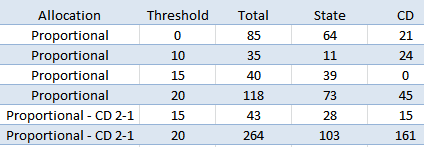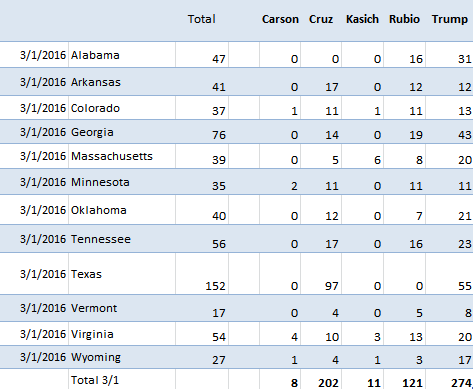A counter-intuitive take, grounded in a close look at GOP delegate allocation rules. -promoted by desmoinesdem
To date, Donald Trump has appeared to be an unstoppable train. He has a significant lead in delegates, and leads in virtually all of the polling on Super Tuesday. There would appear to be little drama.
And yet in fact there is. The reason for this is to be found in the delegate selection rules. In state after state (Texas is the notable exception) the polling is reasonably stable: Trump between 30 and 40, and Ted Cruz and Marco Rubio hovering around 20%. When you actually project these polling numbers into delegates however, two things became very apparent:
1. Many states award delegates only to candidates who win 15 or 20%. In state after state both Rubio and Cruz’s polling shows them within a few points of these numbers. As a result a few percentage points can have an enormous effect on the results.
2. With each poll that is released, it is becoming less and less likely that Trump will get a majority of delegates on Super-Tuesday. In fact, while he will win a plurality of delegates on Super Tuesday, it will be very far from decisive. My current projection shows Trump getting 274 delegates on Super Tuesday, about 50 less than the other candidates combined.
To understand just how volatile Super Tuesday actually is, and how altering a few points can have an enormous effect, let’s look at an overview of the delegate selection process on Super Tuesday. By there way, I have a delegate project for the GOP on Google that is updated continuously. It is available here.

This table summarizes the different ways delegates are awarded. Note the thresholds. What they mean is a candidate in many states who gets 19% will get no delegates. But it is more complicated than this. Delegates are awarded in two ways: at the state level and the CD level. In all states that award delegates at the CD level, 3 are at stake. In a large number of states, delegates are awarded on a 2-1 basis. What this means is that the winner of that CD gets 2 delegates, and the candidate finishing second gets 1. But there is a huge IF: If there are more than 2 candidates that get above the threshold in that CD. If only one candidate gets above the threshold, that candidate gets all of the CD’s.
To make this clearer let’s look at Tennessee. Tennessee has a 20% threshold at the state and CD level. If 3 candidates get over 20%, each gets a delegate. If only 2 get over 20% in that CD, than the candidate with the highest vote gets 2 delegates, and the one with the second most gets 1.

This table shows the current polling, and the projected results if we allocated the undecided. It is really important to note how close both Cruz and Rubio are to 20%. If both were to fall below 20%, Trump would get all 55 delegates. If only Cruz and Trump get over 20%, both get delegates, but Trump gets a substantial majority of the delegates. Compare that result to the adjusted result, where the candidates get roughly the same number of delegates (despite a significant Trump popular vote lead) and that Trump DOES NOT get a majority of the delegates at stake.
This table projects the results for all of the states. As it shows, Trump is unlikely to get a majority of the delegates.
I suspect that this will be of a shock to everyone. My guess is the press will spend much of the night on March 1 talking about a brokered convention.
And they will be right to do so. Alas, the rules change after 3/1. More about that later.



No Comments